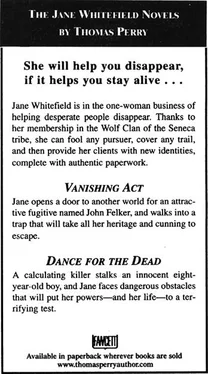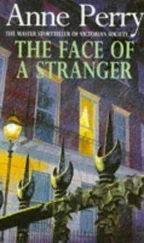Jake stared at the television set, but they had returned to their regular programming. Until the newspeople thought of something else to say, the Blue Jays were back to getting beaten in New York. He went to the window and pushed the curtain aside an inch.
“Not from there,” said Jane. “If you want to watch the street for me, do it from the room at the end of the hall, where it’s dark. What you’re looking for will be a car with too many lights or too few. It will pass once, then come back. Don’t move the curtain. You can see that much through it.”
Jake walked off down the hall to the empty bedroom and did as he was told. He had been skeptical of Jane’s instructions, but now he found he could see much better than he had expected. Through the curtain he could not only make out the sixty-watt lamp in Mrs. Oshinski’s front window across the street, but even the dim patch of light it threw on her front lawn. He could still hear Jane hurrying around in her room, and he felt he could almost see her.
On the day when he had first realized what it was that she had really been doing for a living from the time she was in college until a good ten years later, he had experienced something that had never before happened to him—he had been struck speechless.
Nothing that had come to his lips had been worthy of a thinking man. “Cut it out” had seemed closest, but it was too paltry to meet the scale of the situation. Here was the quiet, pretty, and studious young woman he had known since birth, occupying the house where he had come just about every day until he and her father had both gone off to war, and—no, it was more than that. This was the only house that Jake had ever been welcome to enter without knocking. And when he did, he was expected to smile and sit at the table while the older Mrs. Whitefield, Jane’s grandmother it was in those days, set something in front of him to eat. And here was this little girl, the product of all of those Whitefields, living under this roof while she engaged in the business of taking future murder victims—some of them with legal difficulties of their own—away from their troubles and making them disappear.
When Jane had finally agreed to marry Dr. Carey McKinnon, to Jake’s immense relief, she had appeared to consider herself the last of her fugitives to be taken out of the world. She had not needed to spend time thinking of a new name, because her new husband had a perfectly good one that had been around western New York for a couple of hundred years. She had not needed to do much of anything except start being Mrs. McKinnon instead of Jane Whitefield and let time do the rest. It had seemed to him that she had even begun to look different—the thick black hair hanging long and soft most of the time like a frame around her face, with just a subtle hint of an inward curl at the ends that hadn’t been there before. Even the face itself had begun to seem different to him. Maybe it was just that she considered that a married woman could afford to devote more time to makeup, but he had attributed it to a change in what was behind the face. It had actually struck him that she had lost that sharp, watchful look that had disconcerted him a few times over the years.
But now, after only a year of that, here she was back in this house packing a bag while a wounded murderer rested up on the couch downstairs. He wasn’t quite sure what to make of it. He knew for a fact that she had made a promise to Carey, and he could not imagine Jane breaking her word to her husband. That had been part of the new identity she had invented for herself—a woman who didn’t do things like that.
But Jake had spent enough time in this part of the country and enough time in this very house to know that there were deeper issues involved. The Whitefields had always been very old-fashioned people.
And although the Whitefields and all of the Senecas Jake had ever met were scrupulously law-abiding, they made no secret that the impulse had not come from anything as recent as what a bunch of immigrants in Albany or Washington had voted. The laws simply happened to coincide pretty well with how the Senecas believed a person should behave anyway. The Whitefields were not shy in their judgments of human behavior, but they were traditionalists, and the founders of Seneca culture had not felt the need to include institutions like jails. The old-time Senecas had been in favor of revenge—famous for it. But they didn’t feel that it was society’s place to punish people: not that a person might not deserve it, but that, whoever you were, punishing somebody else simply wasn’t in your job description.
Punishment was a matter that would be taken care of later—not by God, exactly, but close enough. The Senecas believed that the universe wasn’t governed by one benevolent deity. There were twin brothers, grandsons of the first human being, a woman who had fallen from the sky. One twin was good, and when he was referred to in English he was called the Creator. The other was perverse, and one of his names was the Punisher. The European innovation of building jails and using manacles to restrain people seemed to them to be an unwise decision to redundantly build a small and rather amateurish Hell on earth.
As of tonight, Jake was beginning to suspect that he was seeing a new phase of things. He had always felt—no, hoped—that what Jane had done with the first part of her life was an instance of youthful optimism and high spirits taken to an extreme. But what if it was more than that? What if it was an expression not only of what she thought was right, but of who she was and had reason to believe her female ancestors had been, going back to Sky Woman? Jake was familiar with the idea that marriage reformed people—more in second-hand testimony than with his own eyes. But those stories were always that some guy stuck to his promise to stop doing something he knew damned well from the beginning was wrong. Jake couldn’t think of an instance where a woman had saved her marriage by sticking to a promise to stop doing what she believed was right—not consistently and in a sustained way.
“What do you see?” Her voice startled him, and he turned to see her in the doorway.
“Nothing I couldn’t have seen a week ago, if I had looked.”
“Good.”
“Why are you doing this?”
She stood absolutely still. He could see the silhouette of her thin, too small body, her long black hair combed back and tied in a tight ponytail, and it occurred to him that he had not seen her wear it that way since she had gotten married. She spoke quietly. “Carey asked me to.”
Jake’s mind seemed to him to choke for a second, then to start again, like an engine that needed to be taken out and run at high speed to burn off the deposits. “Why?” he said.
“Because if I hide him for a while, then we think the police will find that he’s innocent. If we let him wait in jail, we think the police will find him dead in his cell.”
She looked at him as though she were waiting in case something else needed to be said, but Jake couldn’t imagine what it could be. She turned and disappeared in the direction of the staircase. Jake stared out at the empty street he had been staring at for seventy years. Carey was an educated man and a skilled surgeon, and that was why the whole world had agreed to put “Doctor” in front of his name. But he seemed to have taken a look at this situation and missed the important part.
Carey McKinnon had—by a series of circumstances that, when you analyzed them, came down to luck—been given a beautiful young woman who had the intellect, the courage, and the determination to do virtually anything, but who for reasons that were probably more biological than logical had decided to be his wife. What Dr. Carey McKinnon had seen fit to ask her for was that she go back on the promise he had extracted from her to stop putting herself in danger. Whoever this Dr. Dahlman was, Jake found himself silently praying that he was worth it—not to society, or some other word for a bunch of strangers, but to Carey McKinnon.
Читать дальше












